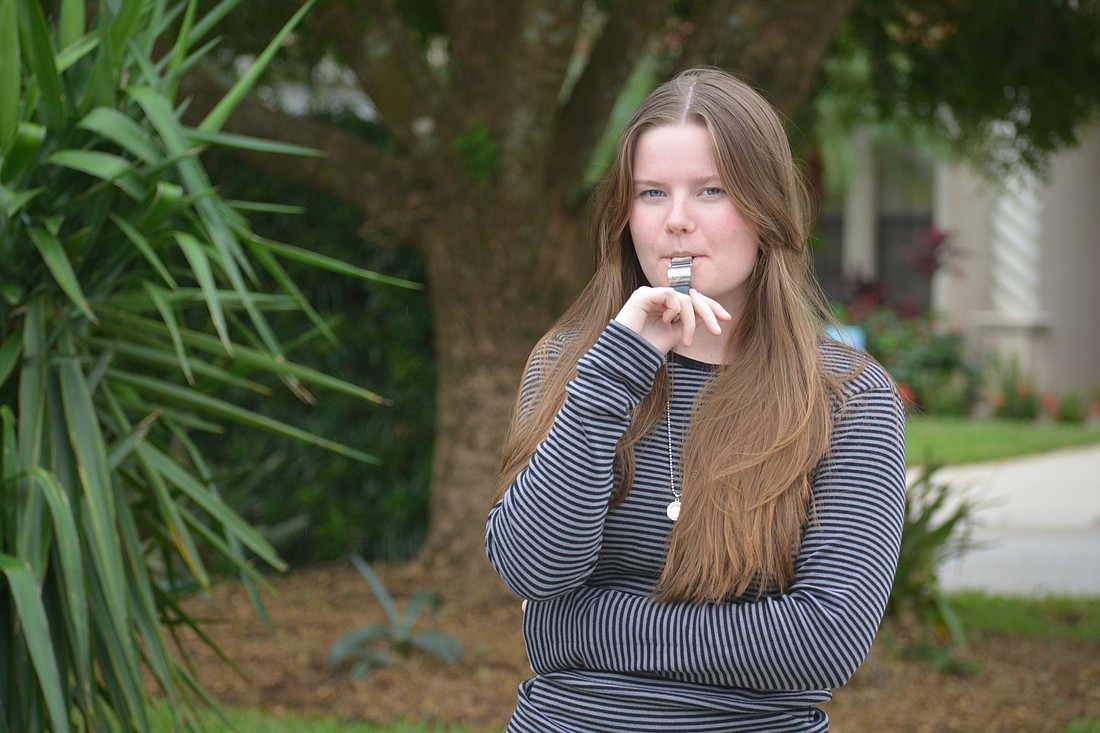- December 27, 2024
-
-
Loading

Loading

Whistleblowers have a tough job.
Just ask Lakewood Ranch's Shannon Boyce.
Boyce, 15, is certified to be an on-ice official through USA Hockey. She attends Lakewood Ranch High and is the youngest official working hockey games at Ellenton Ice and Sports Complex.
She's also the only female official at the rink, one of just six in Florida. Boyce is relatively new to the officiating side of the game, starting just over a year ago, but she's been around the game all her life.
Born in Toronto, she moved with her family to Lakewood Ranch when she was 6 weeks old, Boyce was thrust into hockey fandom by her parents, Ken Boyce and Paula Boyce, both of whom played the sport in their youth. She was skating by 5 years old, though while on the ice she stuck to the boards like they were covered in glue.
Eventually she found the courage to skate in the middle of the ice, which turned into the courage to play hockey herself. Ken Boyce was a goalie, but he talked Shannon out of following his path as he thought she would have to be crazy to voluntarily take pucks to the chest and face like he did. So she became a forward.
Besides officiating, Boyce plays in Ellenton's recreational league on a mixed-gender team that has two other girls. But she has come to realize her time left as a hockey player is limited.
The guys she plays against, also 15 years old, are learning to body check like adults. Most of them are already bigger and stronger, and some of those opponents are as big as 6-foot-4. That size and strength spells trouble and raises the potential for injury for the 5-foot Boyce.
There are no girls-only leagues in the area. The closest one is in Wesley Chapel, a 90-minute drive each way with light traffic. So Boyce is meeting her hockey fate head-on, by taking a look at officiating.
"I want to keep skating and stay a part of hockey," Boyce said. "I'd rather referee than coach. Coaches, they stand on the bench the whole time. They're not active. I like actually being on the ice."
So Boyce began her refereeing journey, which involved lots of studying. USA Hockey has four levels of refereeing as well as a chart showing what level of referee it recommends should work each level of hockey. Boyce is currently a Level Two referee, which means she is recommended to work 14U recreational games and 12U travel hockey games.
Before getting certified for each level, applicants have to pass a test proving their hockey rules knowledge is sufficient. Boyce is currently studying to become a Level Three referee, which would qualify her for games up to the Junior C level (16-21 years old).
Soft-spoken, Boyce doesn't seem like the type of person who wants to endure the kind of verbal abuse you can get as a referee. Take it from me, a former baseball umpire, people have no problem giving you a piece of their mind if you make a call — correctly or not — against their team.
Boyce said a switch flips in her brain when she drops the puck for a game. She's going to make all the necessary calls because that's her job. Parents and coaches can complain all they wish as it's a part of the game, and she is more than willing to explain why she's in the right, as long as they remain respectful.
"If they're actually yelling, I'll ignore them and continue to do my job," Boyce said.
Mostly, Boyce said, things go fine at her games. Except the first one she officiated, which was game of 11-year-olds. At that game, she said, a fight broke out between two players.
"They were throwing punches," Boyce said. "I kind of froze. I didn't know what to do."
Thankfully, Boyce's officiating partner that night broke up the fight and sent the kids to the locker room. They were done for the game.
Boyce said she's only seen something similar happen once since that game, and she was able to break up the incident before any real punches were landed.
Usually, the calls Boyce has to make are more tame. Boyce said there are a lot of tripping calls, especially at the younger age levels. They're trying to swipe at the puck, but beginner players often have trouble controlling their stick, which leads to a lot of falls. Boyce said she sometimes feels like a babysitter when working those games, helping players skate into the correct position on face-offs and telling them exactly what they did wrong if they commit an infraction.
Boyce doesn't mind the feeling. If it's a way to stay on the ice, she'll take it.
Shoyce said she can envision herself continuing down this path through college. After that, she'll see how she feels. Right now, she's happy where she is and proud of being one of a handful of girls doing what she does.
"It's cool," Boyce said. "There are a few younger girls who have seen me do it and have told me they're interested in it now, as well as some of my guy friends, too. I like that I'm inspiring people to check it out."